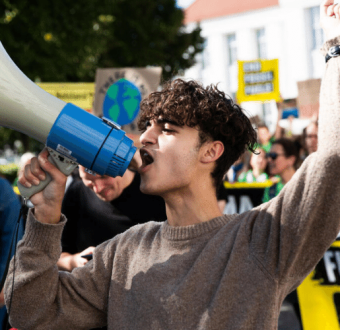Today marks the beginning of the Democratic National Convention (DNC), where the party will — in theory — come together around what it’s calling the “most progressive platform in party history.” And if that platform is any indication, climate change will figure heavily in the discussion this week.
The Dems have come a long way since embracing a deeply flawed “all of the above” energy strategy in 2012.
Their new platform places renewable energy at the center of economic growth and job creation. It recognizes the intersections of social and environmental justice, with specific references to the Flint water crisis and the impacts of climate change on communities of color and indigenous populations. And it empowers the Department of Justice to investigate fossil fuel companies for their role in spreading climate denial.
This places them in stark contrast to Republicans, who groaned at the mere mention of climate change at their convention last week.
This week should tell us even more about the direction to the Dems are heading on climate change, including how they’ll address some of the platform’s shortcomings. Here’s what to watch for.
1. Where does the party stand on fracking and natural gas?
Well, it’s complicated.
Fracking has no place in the platform of a party that wants to “lead the fight against climate change around the world.” By not advocating a national ban on fracking, the Dems are falling short of the action we need to avoid its catastrophic health, climate, and public safety impacts.
Your chances of asthma attacks are higher if you live near a fracking site https://t.co/sRnGLi0pzU pic.twitter.com/swmAhE7JsH
— ThinkProgress (@thinkprogress) July 20, 2016
Instead, they’re shirking responsibility by stating that fracking “should not take place where states and local communities oppose it.” Translation: everyday people will have to go head to head with the fossil fuel industry to keep their communities frack-free. For an indication of just how difficult that is, look at Colorado right now.
On top of tepid regulations, the party leadership’s problematic history with fracking is cause for concern. Both presumptive presidential candidate Hillary Clinton and her vice presidential pick Tim Kaine have a long record of supporting fracking and pushing the false narrative of natural gas as a “bridge fuel.”
As the Democrats try to position themselves as climate leaders, pay particular attention to how how this presumptive Democratic ticket talks about fracking, or if they choose to skirt the issue.
2. Will support for the Trans-Pacific Partnership (TPP) erode?
The Dems have chosen not to oppose the TPP, the secretly negotiated trade deal that would open the door to increased corporate influence over environmental decision-making.
It’s a curious decision, as President Obama is the only high profile Democrat left in favor of the deal. Both Clinton and Bernie Sanders have opposed it since last year, citing concerns over how it would outsource jobs overseas.
Hillary's statement on the Trans-Pacific Partnership: pic.twitter.com/dL3f5cCvFP
— Hillary Clinton (@HillaryClinton) October 7, 2015
But that’s not all that the TPP would do. It also makes it easier for fossil fuel companies to export natural gas with little to no environmental review, creating economic incentive for even more fracking (see above for why that’s a terrible idea).
Look to see which side of the aisle party leaders fall on this week, and if there any notable changes in position, like Kaine coming out in opposition earlier this week after voting in favor earlier this year.
3. When can we expect some actual commitments to keep fossil fuels in the ground?
Unlike people across the country, the Democrats have yet to fully embrace the keep it in the ground movement, but they seem to be inching closer.
Their platform would protect the Arctic and Atlantic Oceans from offshore drilling, but not the Gulf of Mexico. It calls for “reform[ing] fossil fuel leasing on public lands” and “phas[ing] down extraction,” but gives little detail as to what that actually means. And of course, fracking.
The Dems should listen to communities calling for an end to new fossil fuel infrastructure, like those organizing against oil exploitation in the Gulf South and those protesting fossil fuel leasing in the Mountain West. And they won’t have to look far for cues — thousands joined a march for clean energy and an end to the fossil fuel era in downtown Philadelphia yesterday.
Happening now: Thousands march for clean energy in Philadelphia #DNCinPHL #CleanEnergyMarch pic.twitter.com/MLAZFgtf3U
— Democracy Now! (@democracynow) July 24, 2016
This week, keep an eye on how far progressive members of the party — like Keep It in the Ground Act authors Jeff Merkley (Senate) and Jared Huffman (House) — are able to push their more moderate colleagues on fossil fuel extraction.
And now for some perspective.
At this point, it’s also worth a friendly reminder that the official Republican energy platform is literally terrible, Donald Trump thinks climate change is a “myth” (ever the ticket of nuance, his running mate Mike Pence prefers “hoax”), and the GOP is the only conservative party in the world to deny the science of climate change.
The concept of global warming was created by and for the Chinese in order to make U.S. manufacturing non-competitive.
— Donald J. Trump (@realDonaldTrump) November 6, 2012
That just feels relevant right now.


